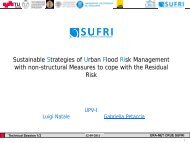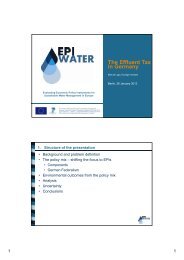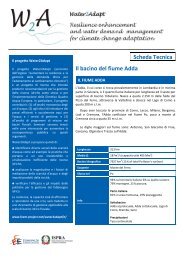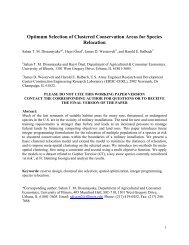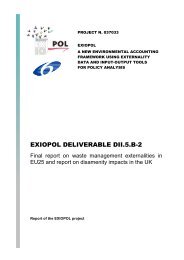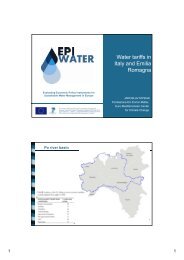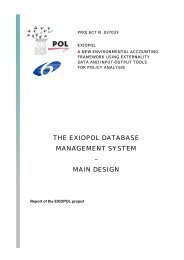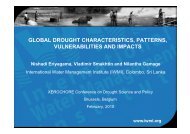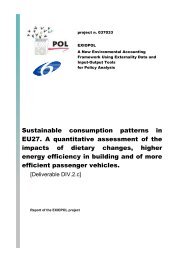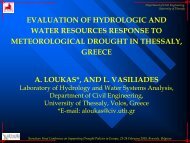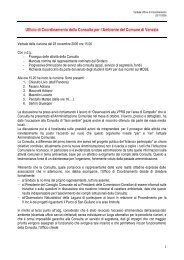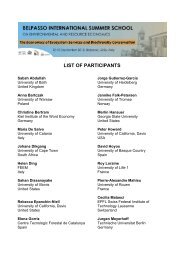Gulf and European Energy Supply Security - Feem-project.net
Gulf and European Energy Supply Security - Feem-project.net
Gulf and European Energy Supply Security - Feem-project.net
You also want an ePaper? Increase the reach of your titles
YUMPU automatically turns print PDFs into web optimized ePapers that Google loves.
considered an issue. Though the border has been<br />
closed since 1994 <strong>and</strong> relations between Algeria<br />
<strong>and</strong> Morocco can still be considered bad, it has never<br />
prevented the Maghreb-Europe pipeline (Pedro<br />
Duran Farell) from bringing gas to Spain. As of today,<br />
there is no reason why this would change.<br />
A source of greater concern is the course taken<br />
by domestic politics. In fact, “the real security<br />
threats are not so much transnational as local <strong>and</strong><br />
humans.” 16 Algeria has known decades of instability<br />
caused by the post-independence institutional<br />
chaos <strong>and</strong> the struggle against Islamic groups such<br />
as the FIS (Front Islamic du Salut) <strong>and</strong> GIA (Groupe<br />
Islamique Armé) in the 1990s. This has weakened<br />
the country, although direct terrorist threats in the<br />
northern part of the country <strong>and</strong> in urban centres<br />
seem to have become more sporadic in the last few<br />
years.<br />
In April 2009, President Bouteflika won the<br />
presidential elections for the third time. There<br />
is some concern owing to the fact that, to a large<br />
extent, the stability of the country is due to President<br />
Bouteflika’s control of the government, <strong>and</strong> he will<br />
not be able to retain power forever.<br />
If a radical Islamic political formation were to<br />
come to power in Algeria, the consequences on<br />
the management of mineral resources would be<br />
unpredictable.<br />
This, however, remains a low-probability risk.<br />
The AQIM group has been at the center of much<br />
discussion, but the probability that it may undertake<br />
a major terrorist action against energy infrastructure<br />
remains limited.<br />
Another uncertainty representing a risk for<br />
the future is the increasing domestic dem<strong>and</strong> for<br />
gas that could upset export strategies. President<br />
Bouteflika’s government wants to exp<strong>and</strong> Algeria’s<br />
domestic industrial capacity. Much of Algerian<br />
power generation comes from gas-fired stations,<br />
<strong>and</strong> the government has induced a switch from oil to<br />
gas consumption. If domestic consumption reaches<br />
50 bcm/yr by 2030, as the OME forecasts, it is hoped<br />
that the necessary investments in new fields will be<br />
performed in time so that exports are not affected<br />
(180 bcm/yr expected by 2030). It must also be noticed<br />
that Algerian domestic dem<strong>and</strong> may increase by 7.4<br />
Geopolitical Issues of Europe’s Future Gas <strong>Supply</strong><br />
percent per year on average <strong>and</strong> would thus double<br />
by the end of the next decade (2018), according to<br />
a report from the Algerian Ministry of <strong>Energy</strong> <strong>and</strong><br />
Mines presented on September 24, 2009. 17 Although<br />
it is doubtful that the country has the capacity to<br />
generate a growth rate capable of absorbing this<br />
increase, those figures nevertheless show the clear<br />
intention of the government to privilege domestic<br />
consumption of gas so as to maximize oil exports.<br />
The recent Algerian call for the rapid<br />
establishment of a gas OPEC so as to increase gas<br />
prices is a further cause of concern. Algeria’s former<br />
<strong>Energy</strong> <strong>and</strong> Mines Minister Chakib Khelil recently<br />
said that gas prices are “unjust” <strong>and</strong> should be “two<br />
times their current level.” 18 He also called for a new<br />
gas pricing system. Also, experts from the <strong>Energy</strong><br />
<strong>and</strong> Mines ministry have claimed that Algeria is<br />
committed to increasing the volume of gas being<br />
sold through short-term contracts or via the spot<br />
market. Two new LNG trains with a capacity of<br />
9mn tons/yr will come on-stream soon, which will<br />
allow the volumes sold spot to double, from 10bcm/<br />
yr today to 20bcm/yr by 2012. The development<br />
of the new LNG terminals in Arzew <strong>and</strong> Skikda<br />
could be a signal that Algeria wants to diversify its<br />
exports destination in order to be less dependent<br />
on Europe.<br />
However, facts tell us a different story. The<br />
construction of the Galsi pipeline, which will connect<br />
Algeria <strong>and</strong> Northern Italy (via Sardinia), <strong>and</strong> the<br />
impending entry into operation of the alreadyconstructed<br />
Medgas pipeline will help to strengthen<br />
EU-Algerian relations.<br />
2.4.2 Libya<br />
For the moment, Libya is a relatively small<br />
supplier of gas. The country has put little effort<br />
in exploration <strong>and</strong> shown only limited interest<br />
in the gas business. Its reserves are smaller than<br />
Algeria’s (1.5 tcm according to BP, 2009) but<br />
the country is also largely underexplored. The<br />
actual small production of 15 bcm/yr is expected<br />
to increase rapidly in the future <strong>and</strong> could reach<br />
55bcm/yr by 2030. 19 In 2008, only 10 bcm were<br />
exported (Eurostat, EIA), <strong>and</strong> only two <strong>European</strong><br />
countries, namely Italy <strong>and</strong> Spain, were supplied.



